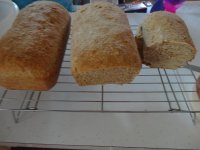Big weekend of cooking. Made fettucine alfredo... as in I made the pasta from scratch and the sauce from scratch. Forgot to take a picture. Very nummy! Had some of my white bread to go with it, and of course, it was served on a bed of spinnach. I also tried to make pumpkin seitan today. It cooked, but how does it taste? Won't know until tonight.
My research on bread has told me a few things.
1) Hydration. Need more water with wholer grains.
2) Soaking. Pre-soaking grains or flours helps, at least in some ways with using the wholer grains.
3) Kneading. Whole grains are wholer than white flour. This means they can cut your gluten, totaling messing up your rise.
4) Sugar. Yeast are people too and people need food to survive.
So, with all these things in mind, I went bonkers. I pre-soaked my 1.5 cups of 7 grain cereal with the recipe required 1 cup of water for about 30 hrs. Too busy to use it yesterday, so it got the whole day treatment. And I went into the process assuming I'd add as much water I thought necessary and just say "fuck the recipe".
I followed the recipe at points. I put the white flour, brown sugar, salt, and yeast together and then added the pre-soak cereal. The recipe calls for the cereal after adding the water, but I wanted to know how much moisture I had in the pre-soaked cereal. Also, my other swerve was that it calls for adding the oil before adding the water. I waited to do that after I added the warm water. To me, it makes no sense to added oil before water because you can't possibly get it to mix properly. One other thing, I added a half tablespoon of white sugar, just because it seemed like the right thing to do, fearing maybe the earlier loaf attempt didn't have enough sucrose for the poor yeast to feast on.
So with most of the grains together, the dough wasn't moist at all. So I add the 1 cup of warm water (meaning I have pretty much doubled the water in the recipe). Add the oil, and I mix. It is pretty wet. I then follow the directions and easily added 1.5 cups of whole wheat flour (no pre-soaked). The dough isn't dough, it is very sticky. So I add another half cup of whole wheat flour (2 cups total). It dries up a little, but not alot. I decide to take what I have, and put it on a well floured pastry mat and start kneading. I keep adding white flour while kneading, and the white is absorbing into the dough, as I knead. Probably 1 to 1.25 cups of white flour later, I have a pliable dough. I end up kneading until the dough is semi-elastic, and can handle a few pulls before starting to tear. I consider this unkneading the dough. I do my microwave trick of boiling water in a two-cup pyrex glass container, cover my dough in the bowl and keep both in the microwave and hope it rises.
And rise it did! And by adding 2+ more cups of flour, I had a bit more dough and was going to need two pans. I do the rolling, the dough is slightly sticky (more so than usual), but it rolls well, I do the loaf thing, place it the loaves in the pyrex glass pans and do my oven trick of heating at the lowest temp for a few minutes, then turning it off and putting the dough in the oven.
The dough rises just fine on the second rise. Set oven to stun and bake!
I didn't brush any butter on them, and then still came out pretty nicely browned. Cooling rack a bit, cut a heal off (as my last fear is an over yeasty taste, which my pumpernickel sucked of and the whole grain loaf (brick) had hints of). It tasted perfect!
So I'm left with a quandry. Did my extra steps and intution lead to a perfect baking experience, or did the yeast simply not take in my last attempt. I simply don't know and will need further experimentation to determine the cause.
I'll post picks later.

